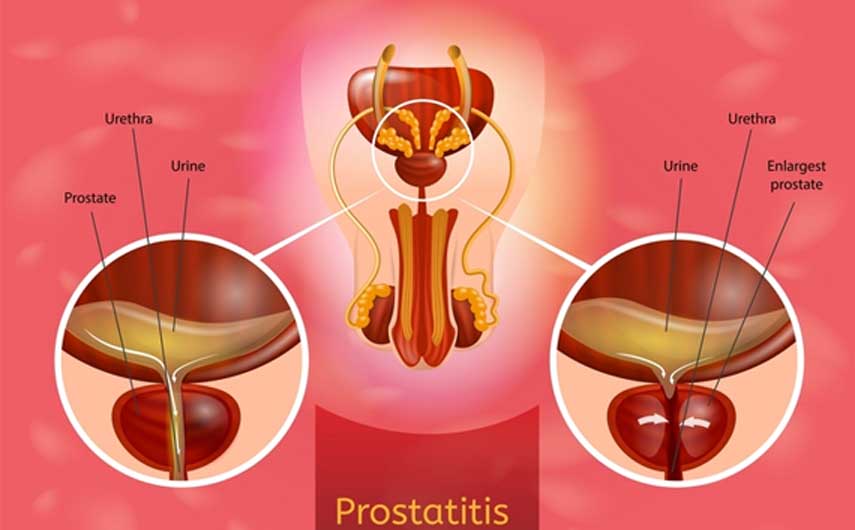
Chronic Prostatitis Chronic Pelvic Pain Syndrome (CP/CPPS)
What is Chronic Prostatitis/Chronic Pelvic Pain Syndrome (CP/CPPS), and How You Can Treat It
What is Prostatitis?
Care for yourself, so you can care for your loved ones!
Prostatitis is inflammation of the prostate gland in men. Prostatitis can be acute (sudden-onset) or chronic(persistent). A man at any age can have prostatitis. There are several types of prostatitis a man can suffer.
Types of prostatitis
The following are the four types of prostatitis.
1. Chronic Prostatitis (CP)/ Chronic Pelvic Pain Syndrome (CPPS)
Chronic Prostatitis (CP) is in flammation of the prostate gland.
2. Chronic Bacterial Prostatitis (CBP)
Chronic Bacterial Prostatitis (CBP) is a type of bacterial prostatitis.
3. Acute (Sudden) Bacterial Prostatitis
Chronic (sudden) Bacterial Prostatitis is also a type of bacterial prostatitis.
4. Asymptomatic Inflammatory Prostatitis (AIP)
Asymptomatic Inflammatory Prostatitis (AIP) is inflammation of the prostate gland.
What is Chronic Pelvic Pain Syndrome (CPPS)/Chronic Prostatitis (CP)?
There are different types of prostatitis, and one of them is Chronic Pelvic Pain Syndrome (CPPS) or Chronic Prostatitis (CP). Chronic Pelvic Pain Syndrome (CPPS) is the inflammation of the prostate and irritation of the nerves of the prostate gland. Middle-aged or young people commonly suffer from Chronic Pelvic Pain Syndrome (CPPS) or Chronic Prostatitis (CP).
Classification of Chronic prostatitis (CP)/ Chronic Pelvic Pain Syndrome (CPPS)
Chronic Pelvic Pain Syndrome (CPPS) or Chronic Prostatitis (CP) is classified into the following.
1. Classification of Chronic prostatitis (CP)/ Chronic Pelvic Pain Syndrome (CPPS)
In Inflammatory CPPS/CP cases, semen, urine & fluid secreted by the prostate contains infection-fighting cells. The juices in the inflammatory CPPS cases do not have any bacteria.
2. Classification of Chronic prostatitis (CP)/ Chronic Pelvic Pain Syndrome (CPPS)
In Non- Inflammatory CPPS/CP cases, semen, urine, and fluid secreted by the prostate do not contain infections fighting cells. The liquid in the Non-Inflammatory CPPS case does not contain any bacteria.
Causes of Chronic prostatitis (CP)/ Chronic Pelvic Pain Syndrome (CPPS)
Prostate Cancer, pelvic floor tension, prostate stone, and urethral stricture are the reasons that can cause Chronic Pelvic Pain Syndrome (CPPS) or Chronic Prostatitis (CP).
Symptoms of Chronic prostatitis (CP)/ Chronic Pelvic Pain Syndrome (CPPS)
Chronic Pelvic Pain Syndrome (CPPS) or Chronic Prostatitis (CP) symptoms are hard to diagnose because the symptoms are similar to other urology diseases. consult Dr Sandeep Nunia, as he is the best urologist in Jaipur.
The following are some symptoms of Chronic Pelvic Pain Syndrome (CPPS) or Chronic Prostatitis (CP) a person may face
- If a person is having pain in the genital or pelvic area, then he might be having symptoms of CPPS/CP.
- If a person is having severe pain while urinating, he might be having symptoms of CPPS/CP.
- If a person is suffering from pain after or during ejaculation, he might be having symptoms of CPPS/CP.
- If a person is having trouble urinating, then he might be having symptoms of CPPS/CP.
- If the person is suffering from pain in the testicles, penis, bladder, he might be having symptoms of CPPS/CP.
Diagnosis of CPPS/CP
The following can predict CPPS/CP
- Urine test
- Examination of the prostate gland
- Tests of urinary tract or kidneys
Treatment for Chronic Pelvic Pain Syndrome (CPPS) or Chronic Prostatitis (CP)
The following are the possible treatments to treat Chronic Pelvic Pain Syndrome (CPPS) or Chronic Prostatitis (CP) of a person.
- Antibiotics
Antibiotics can eliminate bacteria and reduce the inflammation of the prostate.
- Prostate massage
Prostate massage by your urologist can also give you relief from severe pain.
- Dietary changes
Dietary changes like avoiding food that triggers symptoms of Chronic Pelvic Pain Syndrome (CPPS) or Chronic Prostatitis (CP)
- Biofeedback or physical therapy
Biofeedback or physical therapy helps men to gain better control over their pelvic floor muscles.
- Surgery
In severe Chronic Pelvic Pain Syndrome (CPPS) or Chronic Prostatitis (CP) cases, a urologist performs the surgery.
- Alpha-blocker medicine
Alpha-blocker medicine alleviates and prevents the symptoms induced by sympathetic over-activation.
- Anti-inflammatory medicines
Anti-inflammatory medicine can eliminate bacteria and reduce the inflammation of the prostate.